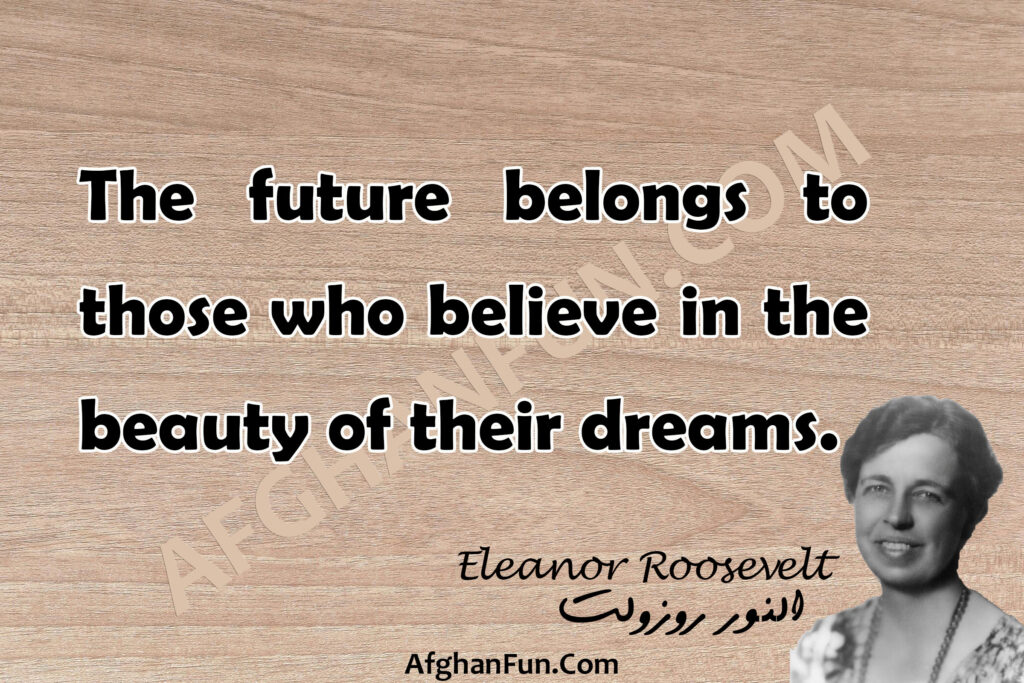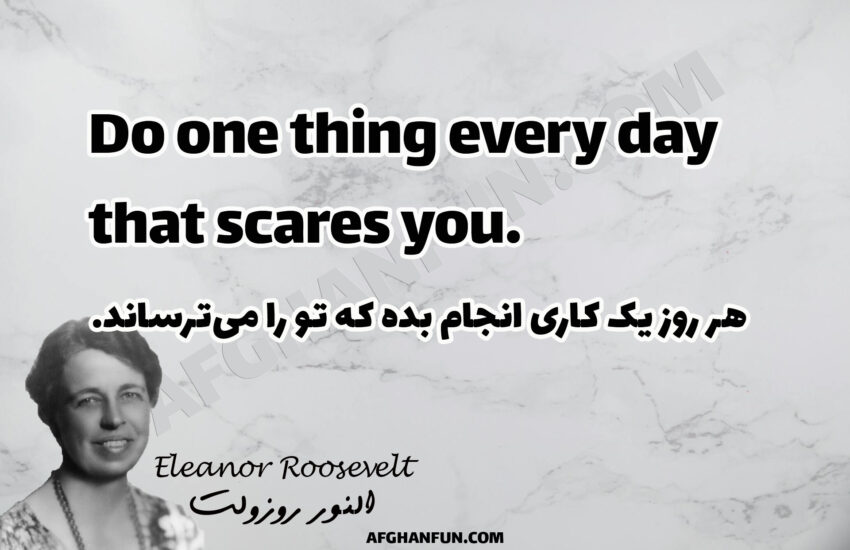Eleanor Roosevelt’s Legacy: The Power of Dreams

The future belongs to those who believe in the beauty of their dreams.
Eleanor Roosevelt
آینده متعلق به کسانی است که به زیبایی رویاهایشان ایمان دارند.
النور روزولت
این جمله بیان میکند که کسانی که به رویاهای خود اعتقاد راسخ دارند و به زیبایی و ارزش آنها ایمان میآورند، قادر خواهند بود آیندهای مطابق با آرزوهایشان بسازند. باور قوی به رویاها، نیروی محرکهای است که افراد را به سمت تلاش و کوشش برای تحقق آنها سوق میدهد.
Оянда ба онҳое тааллуқ дорад, ки ба зебоии орзуҳои худ бовар доранд.
Элеонора Рузвелт
Ин ибора ифода мекунад, ки одамоне, ки ба орзуҳои худ бовар доранд ва ба зебоии онҳо имон меоранд, метавонанд ояндаеро мувофиқи орзуҳои худ бисозанд. Бовари қавӣ ба орзуҳо, қувваи ҳаракатест, ки одамонро ба сӯи кӯшиш ва талош барои таҳқиқи онҳо ҳидоят мекунад.
المستقبل ملك لأولئك الذين يؤمنون بجمال أحلامهم.
إليانور روزفلت
تعني هذه العبارة أن المستقبل ملك لمن يؤمنون بجمال أحلامهم. الإيمان القوي بالأحلام هو القوة الدافعة التي تدفع الناس للعمل والجهد لتحقيقها.
The Inspiration Behind “The Beauty of Their Dreams
Eleanor Roosevelt’s quote, “The future belongs to those who believe in the beauty of their dreams,” carries a powerful and inspiring message about hope, self-belief, and the importance of vision in shaping the future. Here’s a breakdown of its key elements:
1. The Concept of “The Future”:
The “future” here represents the potential, opportunities, and paths that lie ahead in life. It implies that the future is not something predetermined, but rather something that can be influenced by the actions, decisions, and attitudes of individuals today.
The idea is that the future is shaped by those who are actively engaged in creating it, rather than those who passively wait for it to unfold.
2. The Power of Belief:
The phrase “believe in” is central to the quote. Roosevelt emphasizes the importance of belief in one’s own dreams and visions. Belief here is not merely about wishful thinking or passive hope, but an active, guiding force that drives people toward their goals.
Belief in one’s dreams is a motivator—something that propels individuals forward, even in the face of doubt, adversity, or setbacks.
3. The “Beauty of Dreams”:
The “beauty” of dreams is a significant part of this quote. Dreams are often seen as idealistic, abstract, and imaginative visions of what could be. The word “beauty” here connotes not just the desirability or value of dreams but also their transformative power. Beauty in this context refers to the elegance, inspiration, and hope that dreams can provide.
Roosevelt suggests that dreams, especially those that may seem unrealistic or unattainable, have an inherent beauty and value. They give life meaning, direction, and purpose. Dreams, when believed in deeply, can transcend their abstract nature and become the foundation for actual change.
4. The Link Between Belief and Action:
The quote underscores the idea that belief in one’s dreams is not a passive state; it is a precursor to action. Those who believe in the beauty of their dreams are likely to take the necessary steps to bring them to life. It implies that dreams are not mere fantasies but are the starting points for real achievements.
This message aligns with Roosevelt’s own life and philosophy—she was known for her activism, humanitarian work, and belief in social justice, often in the face of considerable obstacles. She herself was a person who believed in the beauty of her vision for a better world, and her actions were driven by that belief.
5. Optimism and Hope:
The quote fosters an optimistic worldview, suggesting that it is not the cynics or the skeptics who create the future, but rather those who retain a sense of wonder and hope. It speaks to the idea that the future can be a reflection of the ideals and dreams we nurture today.
Roosevelt’s words invite people to stay hopeful, reminding them that dreams—when pursued with conviction—can become reality, and this process can lead to positive, transformative change.
6. Relevance to Personal Growth and Leadership:
On a personal level, this quote is a call for self-empowerment. It encourages individuals to trust in their dreams and believe in their own potential. It speaks to the power of self-confidence and resilience in the face of challenges.
On a broader scale, it can also be interpreted as a message to leaders and visionaries: those who can dream big and inspire others to do the same will be the ones to lead society forward.
7. Implied Message of Overcoming Doubt:
Implicit in the quote is the idea that many people doubt the possibility of achieving their dreams. Eleanor Roosevelt challenges this mindset by affirming that those who maintain belief in the beauty of their dreams, even when others may doubt them, are the ones who will create change.
In summary, Eleanor Roosevelt’s quote highlights the transformative power of belief and vision. It suggests that the future is not just a distant, inevitable outcome but something that is shaped by those who have the courage to believe in their dreams and take action to make them real. This quote serves as both a personal and collective call to pursue one’s ideals, live with purpose, and contribute positively to the world.
Eleanor Roosevelt (born October 11, 1884 – November 7, 1962) was a pioneering figure in American history, known for her work as a First Lady, diplomat, and human rights advocate. Here’s an overview of her life and legacy:
Early Life and Background:
- Born in New York City into a prominent family, Eleanor Roosevelt was the niece of Theodore Roosevelt, the 26th President of the United States.
- She had a challenging childhood, marked by the early deaths of both her parents (her mother in 1892 and her father in 1894), which left her emotionally scarred. She was raised by her maternal grandmother and was largely isolated and introverted during her youth.
- Eleanor attended Allenswood Academy in London, where she thrived academically and developed a strong sense of independence.
Marriage to Franklin D. Roosevelt:
- In 1905, she married her distant cousin, Franklin D. Roosevelt, who later became the 32nd President of the United States.
- The Roosevelts had six children, though their marriage was complicated. Franklin contracted polio in 1921, and Eleanor became increasingly independent, taking on a larger public role.
- Eleanor’s relationship with Franklin was both a partnership and a challenge. While Franklin had a number of infidelities, Eleanor found her own path through public service and social activism.
Role as First Lady (1933-1945):
- When Franklin became president in 1933, Eleanor redefined the role of First Lady. She was far more active and outspoken than her predecessors, choosing not to be a passive observer of her husband’s political career.
- She used her position to champion civil rights, women’s rights, and labor rights, advocating for the poor and marginalized during the Great Depression.
- Eleanor gave regular press conferences and wrote a popular newspaper column, “My Day”, which addressed a wide range of topics, from politics to social issues.
- She was an advocate for New Deal programs that provided aid to struggling Americans, particularly women and minorities.
Advocacy for Human Rights:
- Beyond her work as First Lady, Eleanor became a tireless advocate for human rights and social justice.
- In 1945, after Franklin’s death, she was appointed as a delegate to the United Nations General Assembly, where she became the first chairperson of the United Nations Commission on Human Rights.
- One of her most notable achievements in this role was her leadership in drafting and promoting the Universal Declaration of Human Rights in 1948. This declaration set out fundamental human rights that should be protected for all people, regardless of race, nationality, or religion.
Civil Rights and Social Justice:
- Eleanor was an outspoken advocate for racial equality, particularly during the civil rights struggles of the 1940s and 1950s.
- She supported anti-lynching legislation and took steps to challenge racial segregation in her public and private life.
- She worked closely with African American leaders like Mary McLeod Bethune and W.E.B. Du Bois and pushed for greater inclusion of African Americans in government and social programs.
- Despite facing criticism for her activism, particularly from Southern Democrats, Eleanor remained steadfast in her commitment to racial justice.
Later Life and Legacy:
- After leaving the role of First Lady, Eleanor continued her activism, focusing on human rights, civil rights, and promoting the welfare of women and children.
- She was a prolific author and speaker, writing numerous books, essays, and articles on topics ranging from politics to personal reflection.
- In 1961, Eleanor was appointed by President John F. Kennedy to the Presidential Commission on the Status of Women, which worked to address gender inequality.
- Eleanor Roosevelt passed away on November 7, 1962, at the age of 78. She is remembered as one of the most influential women in American history and a global symbol of compassion, determination, and commitment to human dignity.
Key Contributions:
- Human Rights Advocacy: Instrumental in drafting the Universal Declaration of Human Rights.
- First Lady of Action: Redefined the role of First Lady with her activism and public engagement.
- Civil Rights Champion: Fought against racial discrimination and advocated for the rights of African Americans.
- Women’s Rights: Focused on gender equality and worked to improve women’s social, economic, and political standing.
- Social Justice: Championed the rights of the poor, the oppressed, and marginalized communities.
Quotes:
- “The future belongs to those who believe in the beauty of their dreams.”
- “You must do the thing you think you cannot do.”
- “It is not fair to ask of others what you are not willing to do yourself.”
- “Never allow a person to tell you no who doesn’t have the power to say yes.“
Eleanor Roosevelt’s legacy is far-reaching. She was not only a political figure but also a deeply compassionate individual who reshaped the role of women in public life and left an indelible mark on the global human rights movement. Her work continues to inspire movements for equality and justice around the world.











